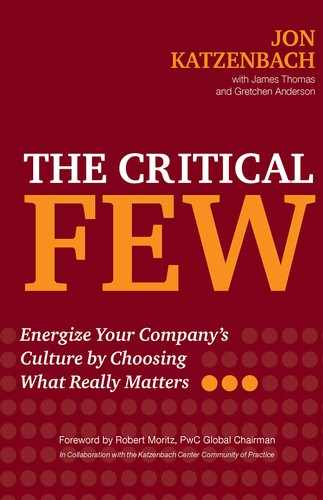Foreword
Transformation used to be something that companies did only in extraordinary circumstances. But today, transformation is something that business leaders have to contend with almost constantly. In a world of rapid technological change, global convergence, increasing external scrutiny, and competition for top talent, all management is now change management.
Executives have come to appreciate the importance of having the right organizational culture to thrive in the new reality they are creating. That is the focus of the latest book by our colleagues at the Katzenbach Center within PwC, Jon “Katz” Katzenbach, James Thomas, and Gretchen Anderson. The book doesn’t promise a secret formula or magic wand to create the ideal organizational culture. Instead, a series of reflections, ideas, and tools are offered to equip executives to use the culture they’ve got as a catalyst for meaningful change within their organization.
The key to doing so, Katz and his coauthors say, is to start small: you don’t need a hundred ideas about who you are but a very narrowly focused group.
For example:
• A company has many traits, but only a few are vital symbols of the new enterprise you’re trying to become.
• A company has many behaviors, but only a few represent the path forward that everyone needs to follow.
• A company has hundreds or thousands of decision-makers, but cultural transformation starts by targeting and harnessing the energies of a select, special— sometimes unconventional—few.
Crucially, the book argues that each organization’s culture already contains the components it needs to fuel successful transformation, and leaders effect lasting, positive cultural change by encouraging behaviors that promote those elements. You don’t need to replace your old culture; you need to find the aspects of it that can help you move forward.
What’s interesting is not only the insights this book delivers but how it does so: not as a set of rules but as a conversation. Literally, The Critical Few presents an ongoing discussion between Katz and “Alex,” a fictional CEO who’s a composite of the many business leaders the authors have engaged with over the years. Many readers will recognize themselves in Alex and find themselves rooting for him and Katz to succeed in their work of harnessing culture to turn Alex’s company around.
The core message of cultural evolution has powerful resonance for us at PwC in our own journey toward even better alignment and collaboration across our global network of firms. This book has amplified my appreciation of the power of our own organizational values and culture, and how we can work better together to have a positive impact on those we interact with and serve.
The Critical Few has real emotional resonance. No company is purely rational. The culture is where its collective emotions reside, and this book shows what’s required to reach those emotions: Clarity. Simplicity. Connection.
Our journey at PwC has been enriched by working with the Katzenbach Center since it joined our network as part of Strategy& in 2014. I am confident that business leaders at all levels within their organizations, and from all manner of organizations around the world, will find much to inspire them in the pages that follow.
Bob Moritz
